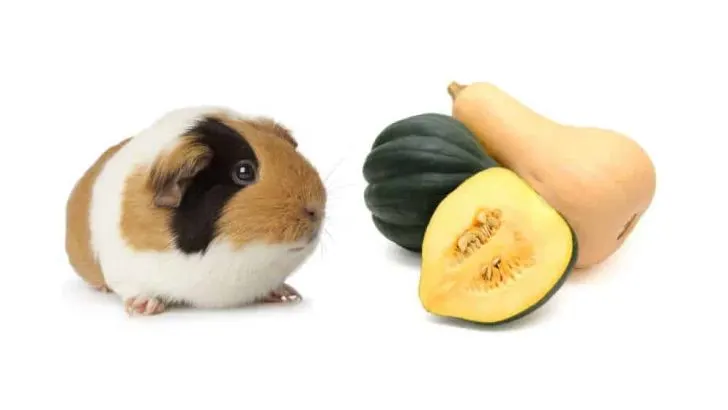Guinea pigs are probably one of the most beloved small pets. These cute pocket animals are not demanding, and they’re easy to live with. However, their diet can cause unnecessary confusion!
Let’s say, for instance, you’re in the kitchen, preparing your favorite squash meal. While chopping up some zucchini, your cavy is looking at you through the metal bars. One tiny piece is in your hand, and you’re wondering – Can guinea pigs eat squash?
Well, we’ll get to the bottom of this! Besides that, we’re going through all the health benefits and potential risks that your piggie may have from eating this versatile plant. So read along and learn all the essentials about squash consumption in cavies!
Let’s get started!
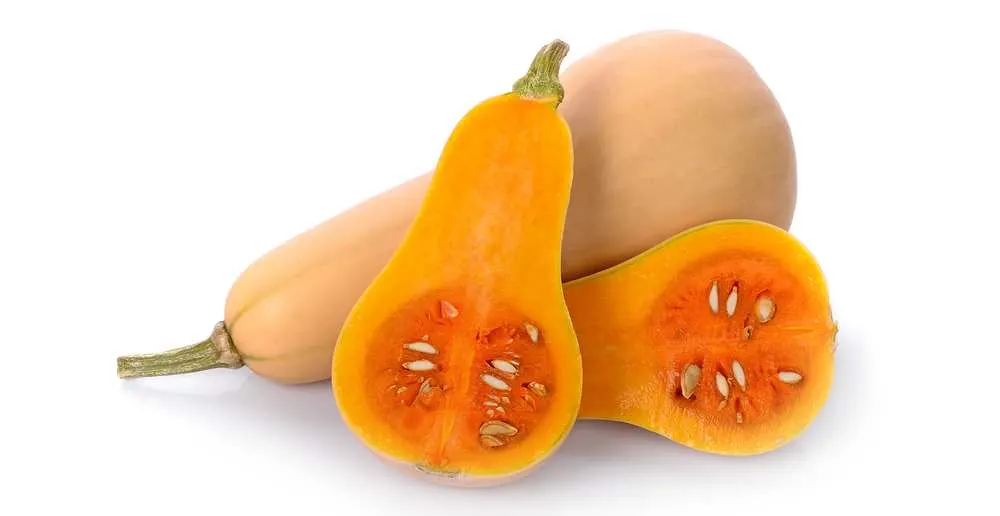
Can Guinea Pigs Eat Squash?
Because of their sensitive digestive tract, owners are usually unsure if they can give their cavy a particular food. Well, to break the uncertainty: absolutely! Your vegetarian friend can enjoy some squash. However, before you leave this article too early, there’s much more to it.
And yes, if you were wondering, the rule applies to all types of squash! Still, that doesn’t mean that you can constantly feed it to them. Squash consumption in guinea pigs comes with some restrictions!
For your guinea pig to have a long and healthy life, their diet should consist primarily of hay. As you probably know, hay is the cavies’ main source of fiber. They derive energy from hay, and it’s an excellent way for them to grind down their teeth. That’s one of the reasons why it should always be available to them.
When given to guinea pigs in moderate quantities, squash can be a fantastic treat to your little friend. However, it’s important to know that treats should not exceed more than 10 percent of your guinea pig’s diet. Overconsumption of anything except hay can bring health issues to your cavy.
These fruits come in many different shapes and colors. There are more than 100 types of squash, and they are grouped into summer and winter categories. The summer squash can be eaten whole, has tender skin and moist flesh. The winter types have a longer shelf-life, and the skin is much tougher.
“Wait, did you just say fruit?”
That’s right! Contrary to popular belief – squash is a fruit!
This fruit consists of fiber, proteins, carbs, nutrients – and a whole lot of water. You wouldn’t think it, but summer squash is 95 percent water! The fact that squash is so high in H²O means that it’s low in calories. That’s good news for your obesity-predisposed pet!
But to get to know squash better, it’s good to look at its nutritional table. We’re using the nutritional value of one cup of raw butternut squash.
| Calories | 63 |
| Fat | 0 |
| Carbohydrates | 16 grams |
| Dietary fiber | 2.8 grams |
| Sugar | 3 grams |
| Protein | 1.4 grams |
| Sodium | 6 milligrams |
As you can see – squash almost has no fat! It has a decent amount of fiber which can help with digestion and sometimes even blood sugar levels. Squash can also be rich in antioxidants, which help the body by preventing degenerative diseases.
Squash also has a lot of vitamins and minerals that are essential for your piggies’ well-being. Some of the prominent vitamins in squash are Vitamin A, Vitamin C, and Vitamin E. Additionally, some of the vital minerals in this fruit are calcium, iron, magnesium, and potassium.
On the other hand, the sweet taste behind squash isn’t so guilt-free. The sugar content in squash depends on the type. Specifically, winter squashes have higher sugar levels. When given in excess, that can’t be good for your guinea pig! But more on that later.
So, how much squash is too much?
Introducing any new food to your pet should be a planned-out but simple process. First, give them a tiny, bite-sized chunk, and wait 24 hours to see if he reacts appropriately.
This kind of monitoring helps determine whether or not your pet is allergic to a particular food or substance. No two piggies are the same; a tasty treat for one could be poison to another!
You can give your adult cavy around two or three small pieces of squash daily. Because it’s still considered a fruit, it counts as a treat! You can mix up the squash pieces with other veggies and make your piggie a nice salad.
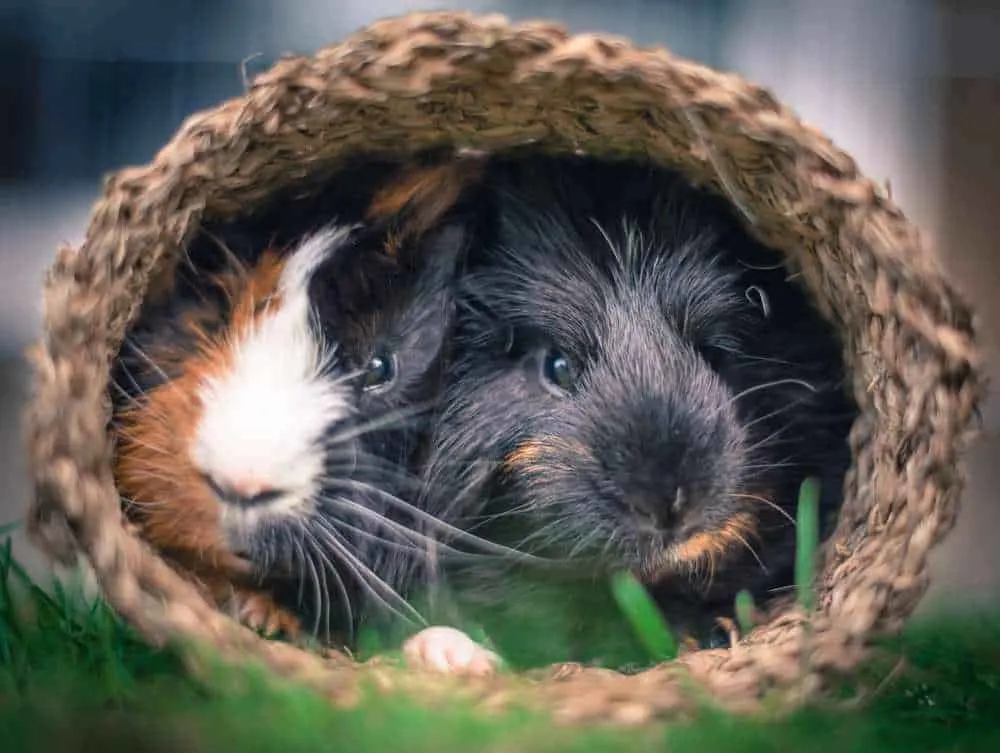
Health Benefits
So squash is low in fat and carbs and has a lot of vitamins and minerals. But what does that mean for your piggie? We can imagine that mere numeration doesn’t really mean anything to you. No worries, here’s an explanation!
Vitamin C
This vitamin is the necessary guinea pig vitamin. Cavies can’t naturally produce or store Vitamin C. This is why guinea pigs are predisposed to a disease called scurvy. This illness is fatal, and it manifests through fatigue, loss of appetite, discharges, and even diarrhea.
To prevent scurvy, guinea pigs need around 30 to 50 milligrams of vitamin C daily. They can get the required dose from vitamin supplements or fruits and veggies. Summer squash has more Vitamin C than the winter types.
Vitamin A
Winter squashes are especially high in Vitamin A. For example, butternut squash contains around 150mcr of this vitamin per cup. Vitamin A is well-known for maintaining good vision, skin, and fur. Besides that, it’s a great immunity booster!
Additional Minerals
Even though these vitamins are prominent, the squash minerals do a fair job helping out your piggies’ health. Manganese reduces inflammation, boosts immunity, and regulates blood sugar. Moreover, potassium lowers blood pressure and prevents painful kidney stones.
Vitamin K, with the help of iron, ensures that your fluffy friend has healthy blood. However, it’s important to give your pet cavy squash in moderation despite all of the fantastic health benefits. If not, the benefits can quickly be canceled out and even turn into some risks.
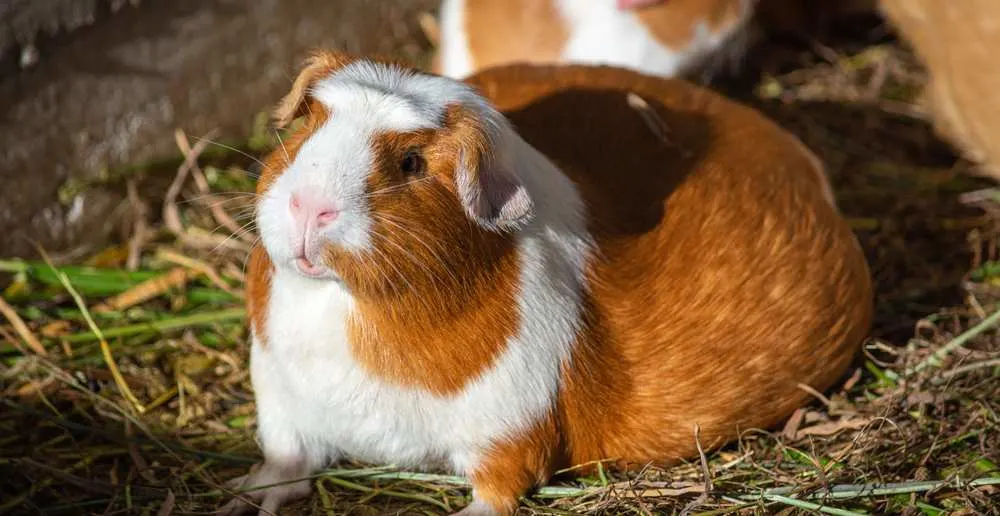
Health Risks
Although squashes have numerous health benefits, there’s always a flip side to the coin. As with anything, too much can’t be good. Even though it seems like squash isn’t that high in sugar, this amount still isn’t low enough for piggies.
Guinea pigs have a sensitive digestive system. Their body isn’t capable of digesting complex carbs and sugars well. When eating foods with higher sugar doses, cavies risk having diarrhea, painful digestion, and cramps.
Because guinea pigs’ digestive tract can easily get upset, diarrhea can occur if your cavy has an imbalanced diet. Diarrhea can lead to dehydration and even death in extreme cases. That’s why it’s very important to give your cavy treats in moderation.
Furthermore, most squashes contain a decent amount of calcium. When cavies are young, it can help them grow strong bones. However, adult guinea pigs shouldn’t consume lots of calcium.
Calcium in squash can cause issues to your piggy’s urinary tract. When cavies ingest too much calcium, it piles up in their urinary canals. That can potentially form bladder or kidney stones. This can lead to bloody urine, infections, or painful peeing.
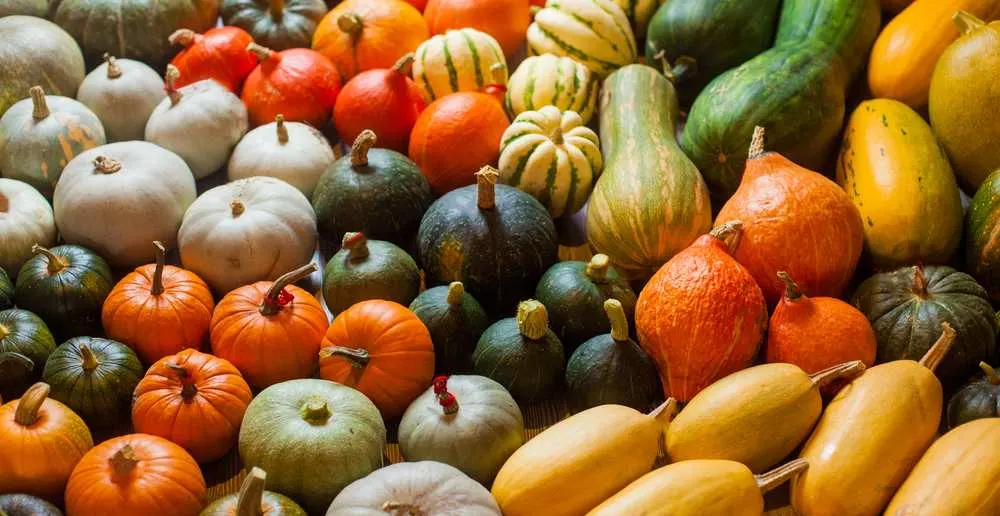
Different Types Of Squash
As you already know, there are just too many types of squashes! Whether it’s zucchini, pumpkin, butternut, or yellow squash – it’s not easy to decide what’s the best option for your cavy. Here’s some information that can help you.
For starters, it’s important to note that both summer and winter squashes are safe for your guinea pig to consume. Squashes that are harvested during the warm summer days are considered summer squash.
On the other hand, even if their name suggests different, winter squash is harvested at the end of the summer. It’s called “winter squash” because of its long shelf life; it can be eaten even in wintertime.
Summer squashes are usually the best option for your furry pocket friend. They have more Vitamin C in them and lack scary calcium. Some popular types of summer squash are pattypan squash, yellow squash, and zucchini.
Squashes categorized under the winter type are less beneficial to cavies. It’s pretty simple: they have less Vitamin C and more calcium. They’re not as great as summer squashes at preventing scurvy and cause a more considerable risk with bladder stones. Well-known types of winter squash are acorn squash, spaghetti squash, and butternut squash.
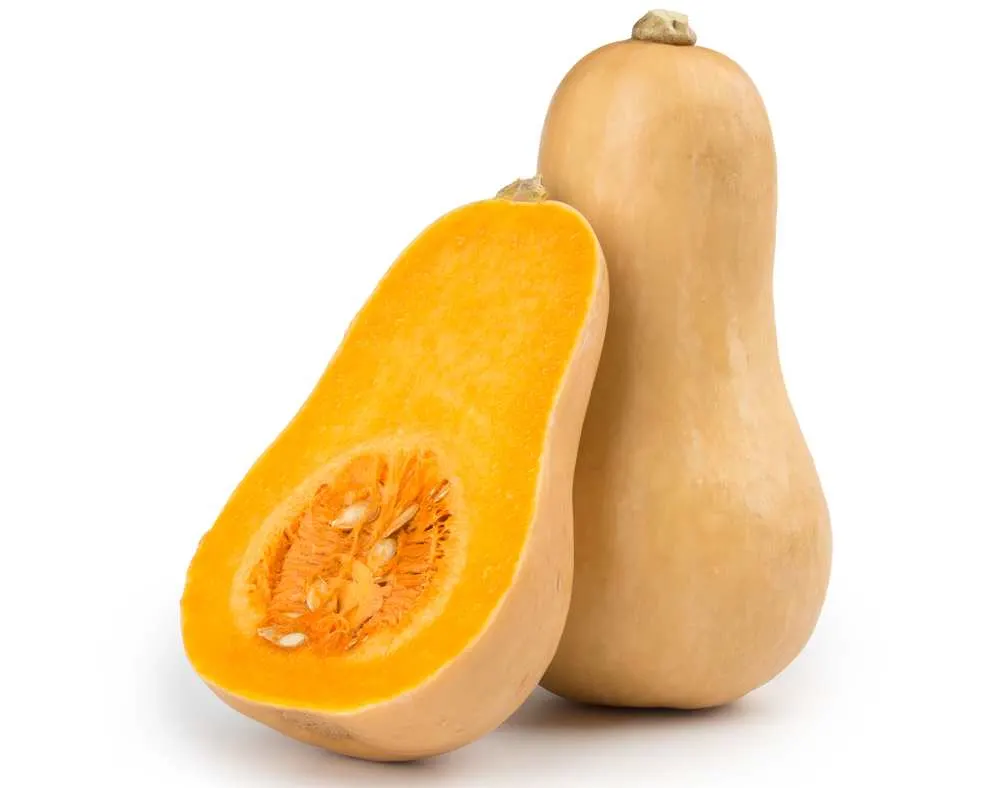
Final Words
Squash is a hell of a treat for your guinea pig! Whether it’s thick or tender-skinned, you have a green light to give to your piggie. Of course, you can’t replace hay with squash. But as a responsible cavy owner, you already know that.
When giving your guinea pig squash, just make sure that it’s fresh, thoroughly washed with water, unseasoned and raw. Be careful not to provide your cavy with too much squash. It’s safe to enjoy it while it’s in moderation. You don’t want to end up at the vet because of too many zucchinis!
Once your piggies diet gets adapted to squash, make that veggie-squash salad for your cavy!

